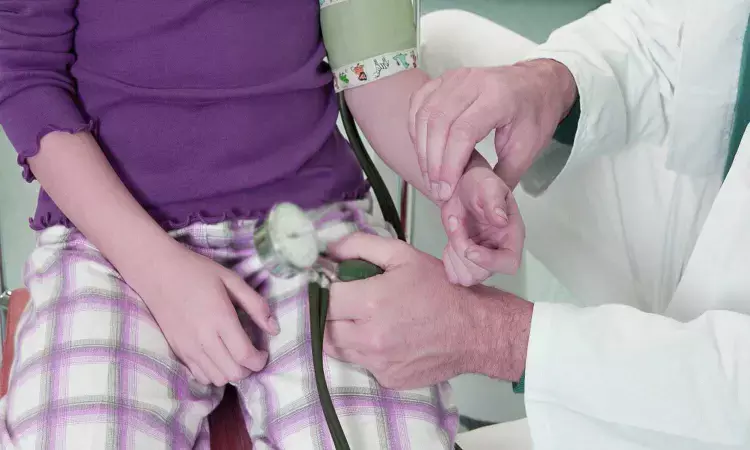- Home
- Medical news & Guidelines
- Anesthesiology
- Cardiology and CTVS
- Critical Care
- Dentistry
- Dermatology
- Diabetes and Endocrinology
- ENT
- Gastroenterology
- Medicine
- Nephrology
- Neurology
- Obstretics-Gynaecology
- Oncology
- Ophthalmology
- Orthopaedics
- Pediatrics-Neonatology
- Psychiatry
- Pulmonology
- Radiology
- Surgery
- Urology
- Laboratory Medicine
- Diet
- Nursing
- Paramedical
- Physiotherapy
- Health news
- Fact Check
- Bone Health Fact Check
- Brain Health Fact Check
- Cancer Related Fact Check
- Child Care Fact Check
- Dental and oral health fact check
- Diabetes and metabolic health fact check
- Diet and Nutrition Fact Check
- Eye and ENT Care Fact Check
- Fitness fact check
- Gut health fact check
- Heart health fact check
- Kidney health fact check
- Medical education fact check
- Men's health fact check
- Respiratory fact check
- Skin and hair care fact check
- Vaccine and Immunization fact check
- Women's health fact check
- AYUSH
- State News
- Andaman and Nicobar Islands
- Andhra Pradesh
- Arunachal Pradesh
- Assam
- Bihar
- Chandigarh
- Chattisgarh
- Dadra and Nagar Haveli
- Daman and Diu
- Delhi
- Goa
- Gujarat
- Haryana
- Himachal Pradesh
- Jammu & Kashmir
- Jharkhand
- Karnataka
- Kerala
- Ladakh
- Lakshadweep
- Madhya Pradesh
- Maharashtra
- Manipur
- Meghalaya
- Mizoram
- Nagaland
- Odisha
- Puducherry
- Punjab
- Rajasthan
- Sikkim
- Tamil Nadu
- Telangana
- Tripura
- Uttar Pradesh
- Uttrakhand
- West Bengal
- Medical Education
- Industry
Adequate sleep significantly reduces risk of hypertension in adolescents, according to new study

Atal Bihari Vajpayee Medical College Set to Launch IPD Services
Adolescents who meet the recommended guidelines of nine to 11 hours of sleep per day were shown to have a significantly lower risk of hypertension, according to a new study from UTHealth Houston.
Recently published in theJournal of the American Heart Association, the research revealed that adolescents had a 37% lower risk of developing incidents of high blood pressure by meeting healthy sleep patterns, and underscoring the importance of adequate sleep behavior. The research further explored the impact of environmental factors potentially impacting sleep.
"Disrupted sleep can lead to changes in the body's stress response, including elevated levels of stress hormones like cortisol, which in turn can increase blood pressure," said first author Augusto César Ferreira De Moraes, PhD, assistant professor in the Department of Epidemiology at UTHealth Houston School of Public Health.
Utilizing the Adolescent Brain Cognitive Development study, which tracks adolescents' biological and behavioral development, De Moraes and his team analyzed data from 3,320 adolescents across the U.S. to investigate incidents of high blood pressure during nighttime sleep cycles. Scientists identified a rise in hypertension incidents over two data periods, 2018-2020 and 2020-2022, showing an increase from 1.7% to 2.9%. The data included blood pressure readings and Fitbit assessments, which measured total sleep time and REM sleep duration at night. The study’s design analyzed covariates such as Fitbit-tracked sleep, blood pressure, and neighborhood noise by residential geocodes, allowing for a thorough examination of environmental noise exposure for each participant.
Scientists investigated the impact of neighborhood/community noise but did not find a significant association with the incidence of hypertension. Environmental factors, such as neighborhood noise, point to the need for longer-term studies to investigate the relationship between sleep health and hypertension, particularly in relation to socioeconomic status, stress levels, and genetic predispositions.
The study emphasizes the importance of improved sleep behaviors and meeting recommendations. "Consistent sleep schedules, minimizing screen time before bed, and creating a calm, quiet sleep environment can all contribute to better sleep quality,"Martin Ma, MPH, second author of the study and recent graduate of the school. "Although environmental noise didn't directly affect hypertension in this study, maintaining a quiet and restful sleep environment is still important for overall well-being."
Reference:
Augusto César F. De Moraes, Martin Y. Ma, Impact of Environmental Noise and Sleep Health on Pediatric Hypertension Incidence: ABCD Study, Journal of the American Heart Association, https://doi.org/10.1161/JAHA.124.037503
Dr Kamal Kant Kohli-MBBS, DTCD- a chest specialist with more than 30 years of practice and a flair for writing clinical articles, Dr Kamal Kant Kohli joined Medical Dialogues as a Chief Editor of Medical News. Besides writing articles, as an editor, he proofreads and verifies all the medical content published on Medical Dialogues including those coming from journals, studies,medical conferences,guidelines etc. Email: drkohli@medicaldialogues.in. Contact no. 011-43720751


